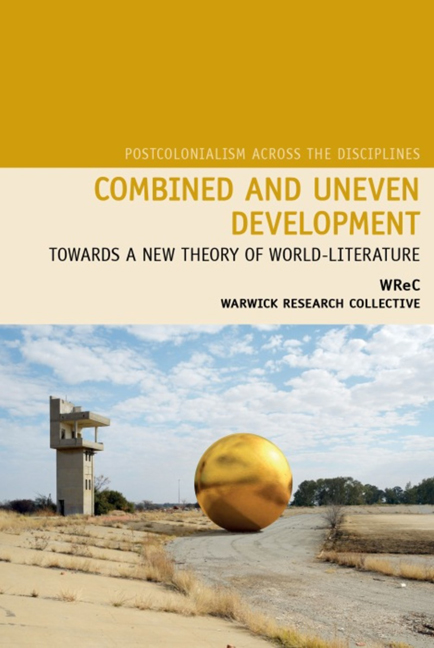Book contents
- Frontmatter
- Dedication
- Contents
- A Note on Collaborative Method
- 1 World-Literature in the Context of Combined and Uneven Development
- 2 The Question of Peripheral Realism
- 3 ‘Irrealism’ in Tayeb Salih's Season of Migration to the North
- 4 Oboroten Spectres: Lycanthropy, Neoliberalism and New Russia in Victor Pelevin
- 5 The European Literary Periphery
- 6 Ivan Vladislavic: Traversing the Uneven City
- Works Cited
- Index
5 - The European Literary Periphery
- Frontmatter
- Dedication
- Contents
- A Note on Collaborative Method
- 1 World-Literature in the Context of Combined and Uneven Development
- 2 The Question of Peripheral Realism
- 3 ‘Irrealism’ in Tayeb Salih's Season of Migration to the North
- 4 Oboroten Spectres: Lycanthropy, Neoliberalism and New Russia in Victor Pelevin
- 5 The European Literary Periphery
- 6 Ivan Vladislavic: Traversing the Uneven City
- Works Cited
- Index
Summary
Bratislava, 1989
Not much is explained about the woman who strips naked in public in Peter Pist'anek's Slovakian novel Rivers of Babylon. ‘A nervous breakdown’ is offered as a possible reason for her disrobing, which occurs in front of the Hotel Ambassador on a busy street in central Bratislava, on a sunny August morning in 1989 (2007: 17). Impervious to the consternation of passers-by, and to a gypsy who robs her, she is eventually taken away in a police car, in one of the few civic gestures made by representatives of a rapidly vanishing state.
Initially, the woman's anguished gesture is focalised through the public's reaction to an apparently random ‘extraordinary situation’ that ‘has brought them together, just as a calamity to be overcome brings people together’ (17). But as quickly as the collective expressions of sympathy, outrage and anxiety appear do they subside and disintegrate. The vaporisation of empathy or even adequate response in Rivers of Babylon indexes the transition from an exhausted communist system to what Peter Petro and Donald Rayfield, in their introduction to the novel in English translation, call ‘another world, of rampant robber barons’ capitalism’ (Pist'anek 2007: 5). But public atomisation and exhaustion are consistent features not only of Rivers of Babylon but also of the fiction of post-communist ‘transition’ in general. As the neoliberal ‘shock doctrine’ rapidly privatises space (urban or otherwise) entirely, alien civic and cultural environments are formed, leaving individuals dangerously exposed in their fungibility and portability, cut off and disconnected from one another: ‘an individualistic society of transients’, in David Harvey's evocative summary of the contemporary – putatively ‘postmodern’ – capitalist lifeworld at large (1989: 288).
Of course, the representation of urban space as both baleful and liberatory is a familiar feature of all literary modernisms. But Bratislava's shift to free-market capitalism impresses a particularly contemporary stamp on this representation. Pist'anek's narrative has uncertainty coded into its very structure. The received modernist narrative modes seem inappropriate for the unbounded world of the post-communist ‘transition’. While many characters ‘lose the plot’ like the stripped woman, others emerge to rig the system criminally – and often brutally – in their favour. Among the spectators at the strip scene are several characters central to the novel's satiric perspective on the new economy born out of the Czechoslovak ‘Velvet Revolution’.
- Type
- Chapter
- Information
- Combined and Uneven DevelopmentTowards a New Theory of World-Literature, pp. 115 - 142Publisher: Liverpool University PressPrint publication year: 2015



